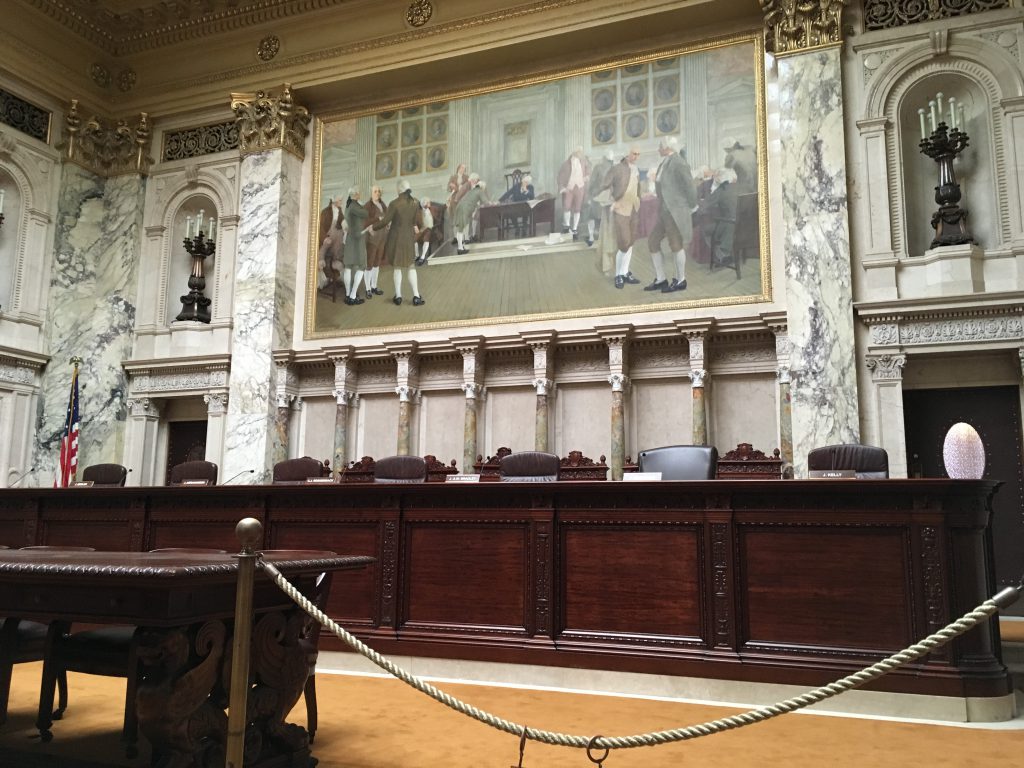Campaign Spending Undermines Our Courts
Out-of-control campaign spending and weak recusal rules are opposed by voters.
Wisconsin, from statehood in 1848 to about a decade and a half ago ago in 2007, had a national reputation for having one of the most respected, impartial, nonpartisan, fair and trusted state court systems in the nation.
Much of this was because there was a generally held belief among Wisconsinites of all political persuasions and ideologies that the courts should be “above politics as usual.” In order to maintain the confidence of the citizenry, judges and justices of the Wisconsin Supreme Court had to be scrupulously nonpartisan and impartial and not be perceived as having been compromised by outside lobbying pressure, campaign contributions or other political influence.
However, the landscape began to shift 14 years ago when outside special interest groups for the first time began to pour millions of dollars into the election of two state Supreme Court justices, one each in 2007 and in 2008. The expenditures made by conservative business organizations, principally the Wisconsin Club for Growth and Wisconsin Manufacturers & Commerce, proved to be pivotal, particularly in 2008 when an incumbent justice was defeated in a nasty, vicious, scurrilous campaign in which a record amount of money was spent — more than $8 million. It marked only the second time in state history that an incumbent state Supreme Court justice was defeated.
Since then, big special interest money has been the norm in Wisconsin Supreme Court elections, culminating in the most expensive in history in 2020 when Dane County Circuit Court Judge Jill Karofsky defeated incumbent Supreme Court Justice Daniel Kelly and more than $10 million was spent – half of it by outside special interest groups.
And even more alarming, the “cancer” of big money special interest group spending is spreading to lower court elections. Earlier this year, hundreds of thousands of dollars of ideological, partisan, and out-of-state, conservative special interest money flowed into two Wisconsin Court of Appeals elections – one in northern Wisconsin and another near Milwaukee.
There had really been no recusal standard for justices or for other court judges receiving campaign contributions or benefiting from “independent” spending by outside interest groups prior to 2007 because campaign money was not a significant factor in judicial elections. Then things changed dramatically. In 2009, in reaction to the unprecedented amount of money spent in the 2007 and 2008 elections, the Wisconsin Supreme Court was petitioned to adopt a recusal rule that would force a justice to recuse her or himself from a case in which one of the parties in the case had donated $1,000 or more to a justice, either directly or to an outside special interest group spending in support of that justice’s campaign. It was rejected by a 4 to 3 vote.
In 2011, the Wisconsin Legislature and Gov. Scott Walker repealed the Impartial Justice Law, which had been enacted in 2009 and had provided full public financing of elections of candidates for the Wisconsin Supreme Court who voluntarily agreed to limit their total spending to $400,000. In 2015, Walker and the Legislature repealed longstanding prohibitions on campaign coordination between candidates and “independent” outside interest groups, thereby effectively eviscerating contribution limits for all elections in Wisconsin and making judicial elections much more partisan.
The result of all these actions has been that much more money, most of it undisclosed and unregulated, is flowing into elections in Wisconsin, including into nonpartisan judicial elections at all levels. It was in this context and very different and new political environment that 54 retired jurists from all over Wisconsin, including two former state Supreme Court justices, petitioned the Wisconsin Supreme Court in 2017 to adopt strong and clear recusal rules for justices and judges at all levels with specific thresholds that would trigger mandatory recusal. Wisconsin was found to have the fourth weakest judicial recusal rules in the nation and these retired jurists sounded the alarm.
But a conservative majority of five justices voted against conducting any public hearings on the petition and similarly, in April of 2017, by the same 5 to 2 vote the Supreme Court rejected the petition of the retired jurists and kept the current policy of “self-recusal” in place.
In late 2017, Public Policy Polling of Raleigh, N.C., polled Wisconsinites on a number of issues, including two on judicial elections and recusal rules. The answers to the two questions showed that 83% of Wisconsinites strongly or somewhat support greater disclosure of campaign contributions and less spending in judicial elections, while only 10% strongly or somewhat oppose greater disclosure and money. Similarly, 82% of Wisconsinites strongly or somewhat favor the adoption of stronger recusal rules for judges while only 12% strongly or somewhat oppose them. Clearly, citizens in Wisconsin support stronger election campaign finance disclosure, less spending and stronger judicial recusal rules.
The answer is yes. By adopting strong recusal rules, reinstituting public financing of elections, limiting campaign spending and enhancing disclosure we can reclaim our courts at all levels. It’s a tall order and big task but one we need to undertake in order to restore fairness and justice for all.
Reprinted with permission of Wisconsin Examiner.
Jay Heck has been the executive director of Common Cause in Wisconsin, the state’s largest nonpartisan political reform advocacy organization, since 1996.
Op-Ed
-
Wisconsin Candidates Decry Money in Politics, Plan to Raise Tons of It
 Dec 15th, 2025 by Ruth Conniff
Dec 15th, 2025 by Ruth Conniff
-
Trump Left Contraceptives to Rot; Women Pay the Price
 Dec 8th, 2025 by Dr. Shefaali Sharma
Dec 8th, 2025 by Dr. Shefaali Sharma
-
Why the Common Council’s Amended Budget is Good Policy for Milwaukee
 Nov 20th, 2025 by Alds. Marina Dimitrijevic and Russell W. Stamper, II
Nov 20th, 2025 by Alds. Marina Dimitrijevic and Russell W. Stamper, II





















